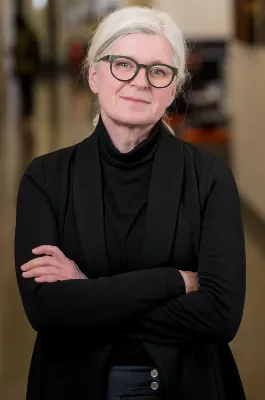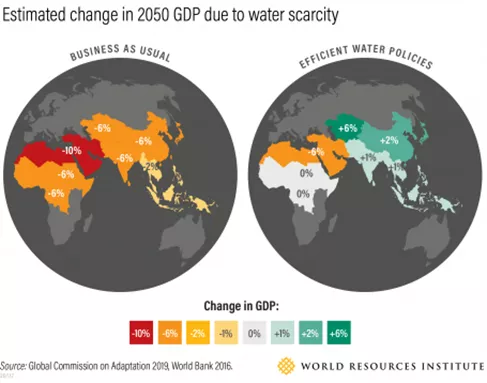The Clean Water Technology Initiative
Oregon State University launched the Clean Water Technology Initiative in 2018 with a generous gift from Jon and Stephanie DeVaan. At the core of this venture is a collaborative community of faculty and students, working together to solve one of the National Academy of Engineering's "Grand Challenges for Engineering in the 21st Century." This effort builds on the university’s strengths, to help make Oregon State a national leader in clean water technology solutions.
The DeVaan’s renewed their commitment to the initiative in 2023. Their further generosity will enable a year-round focus on research, education and outreach, and strengthen philanthropy efforts, marketing and communication, as well as provide leadership around building academic and research partnerships.
RESEARCH EXPERIENCE FOR UNDERGRADUATES
The Clean Water Technology Initiative’s Research Experience for Undergraduates is designed for students who have completed their second or third year at Oregon State.
DeVaan Fellows
The DeVaan Fellows are at the forefront of the creations of innovative water technologies. Their work exemplifies the initiative's commitment to ensuring clean, sustainable water for future generations.
Leading the Initiative: Dorthe Wildenschild
Leading the initiative is Dorthe Wildenschild, professor of environmental engineering. Several scholars within the College of Engineering are recognized nationally and globally for innovative research on water systems. They specialize in improving access to clean water, treating water and wastewater, strengthening upstream processes, protecting ground water resources, and improving the infrastructure needed to manage water sustainably.

The Clean Water Symposium
Worldwide, the availability of clean water faces challenges due to population growth, climate change, pollution from industry and agriculture, and other stressors. Participate in an upcoming Clean Water event at Oregon State University to discover innovative efforts aimed at safeguarding this vital resource, presented by faculty and students.
Clean Water:
Further Details
Foundation for Success
Faculty in the College of Engineering and across campus have national and international reputations for conducting cutting-edge research on the development of advanced water-related technologies for drinking water, wastewater, and stormwater treatment, and on the sustainable management of water/wastewater/stormwater infrastructure.
New Technology, Processes, and Analysis
More specifically, engineering faculty are investigating microreactors and nanotechnology, and developing advanced molecular methods, novel sensors, and image analyses for environmental monitoring and process optimization. Sustainable treatment technologies (including novel desalination methods) and management strategies to improve water quality and reduce aquatic toxicity, are also key research areas.
Other engineering faculty focus on systems-level water resources management, decision-making processes, and numerical modeling. Key focus areas for our faculty working together are advanced biological and chemical processes, the treatment of emerging contaminants, desalination efforts, and improved models for examining the service life of infrastructure elements subject to biogenic deterioration.
Sustained effort over time
Initial research themes within the college include:"
-
technology development for water treatment and reuse (e.g., membranes, catalysts, sensors, advanced chemical and biological processes);
-
development of nondestructive/nonintrusive testing methods and tools to assess deterioration of water and wastewater distribution infrastructure; and
-
development of smart and sustainable strategies for deploying new water treatment technology, mitigating deterioration of water infrastructure, and managing water resources.
Modern research infrastructure
Modern research infrastructure is key in enabling both faculty and student success, and Oregon State has made recent investments in support of our water research, including significant wet-lab space in the planned (2025 completion) Jen-Hsun and Lori Huang Collaborative Innovation Complex, which also will provide access to one of the nation's most powerful supercomputers.
Similarly, existing shared-use laboratories in Johnson Hall support several environmental engineering faculty and their students while two large-scale outdoor experimental facilities: the Green Stormwater Infrastructure Research Facility established in partnership with Benton County, and the Multipurpose River Hydraulics Research Facility give OSU researchers unique tools to use in their quest for practical solutions.
The OSU campus also has multiple laboratory facilities that support research in clean water technology.
Modern research infrastructure is key in enabling both faculty and student success, and Oregon State has made recent investments in support of our water research, including significant wet-lab space in the planned (2026 completion) Jen-Hsun Huang and Lori Mills Huang Collaborative Innovation Complex, which also will provide access to one of the nation's most powerful supercomputers.
Similarly, existing shared-use laboratories in Johnson Hall support several environmental engineering faculty and their students while two large-scale outdoor experimental facilities: the Green Stormwater Infrastructure Research Facility established in partnership with Benton County, and the Multipurpose River Hydraulics Research Facility give OSU researchers unique tools to use in their quest for practical solutions.
The OSU campus also has multiple laboratory facilities that support research in clean water technology.
Other Clean Water Laboratory Facilities:
- Cooperative Chemical Analytical Laboratory
- Electron Microprobe Laboratory
- Electron Microscopy Facility
- Keck Collaboratory for Plasma Spectroscopy
- Mass Spectrometry Laboratory
- MicroCT Facility
- Stable Isotope Laboratory
Oregon's 'Living Laboratory'
Using Oregon's coastal and inland environments and communities as a "living laboratory," Oregon State University intends to be an unparalleled resource in designing, building and testing systems-level approaches to the problem of access to clean water.
Supporting World-Class Research
By offering transformative educational and research opportunities for students and faculty, and making real and substantial contributions to communities, Oregon State will support world-class research and train students to meet one of the world's greatest human development challenges.
Benefits to Oregon
Using Oregon's coastal and inland urban and rural communities as the platform for these efforts will catalyze a systems-level approach supporting informed decision-making.
By further expanding our interactions with external stakeholders and faculty across Oregon State University, we will evolve a highly interdisciplinary initiative focused on the myriad issues surrounding the development and implementation of global solutions for sustainable clean water.
Access to clean water is vital for the economic development of Oregon as well as providing for ecosystem and human health.
Graduates from several engineering disciplines, including environmental engineering, civil engineering, and water resource engineering are highly recruited by state and local governments, industry, water utilities, and engineering consulting firms.
Our current graduates add to the workforce of Oregon and future graduates will contribute to efforts to provide clean water in Oregon and beyond.
Economic Development and Job Creation
It is difficult to assess the economic development that will be associated with the development of technologies that will result in access to clean water.
In 2014, the World Health Organization found that for every dollar invested in water and sanitation, there is a $4.3 return in the form of reduced health care costs for individuals and society around the world (UN, 2014).
The same report also stated that investments in water and sanitation yield substantial benefits for human health and development and the resulting “economic benefits include an overall estimated gain of 1.5 per cent of global GDP” (UN, 2014).

Societal Benefit
Clean water is a human right. Improved access to water and sanitation could lead to a large increase in productivity in developing countries, with potential for rising household incomes and economic growth.
This includes benefits from reduced diarrhea — an estimated 3.2 billion working days would be gained for people ages 15-59 by creating universal access to clean water and sanitation.
Annual time savings from more convenient water supplies would save another 20 billion working days, most gained by women (Tearfund 2008).
College and University Strategic Plans
Funding in the area of clean water technology is directly in line with the college's and the university's strategic plans.
As called out in the COE Strategic Plan 2020-2025, clean water is one of the targeted strategic areas with existing competitive advantages, along with robotics and materials research. Clean water is also a signature research area called out in the university's strategic plan, "Prosperity Widely Shared: the Oregon State Plan."


